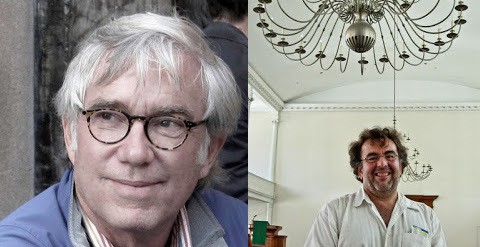Cyberpunks on the State of Science Fiction, Then and Now

(Photos by Sylvia Rucker and Rudy Rucker)
In a special two part Blogtable (Part I and II), NERDS OF A FEATHER, FLOCK TOGETHER explores the past and present of cyberpunk in interviews with Rudy Rucker, Paul Di Filippo, Bruce Sterling, and Pat Cadigan.
This special edition of Blogtable was inspired by a recent symposium hosted by the University of Southern California, which both Vance and I attended. “Visions and Voices: Cyberpunk – Past and Future” was, in a word, fascinating–and featured enough material to build a year’s worth of Blogtables (check out the videosto see what I mean). But it was the first panel, featuring cyberpunk pioneers Rudy Rucker and Bruce Sterling, that really blew my mind. So much so that I spent about 10 minutes composing a question about how and to what degree one might compare the state of the field of science fiction today to what the cyberpunks rebelled against.
Unfortunately, time ran out before I could ask it. Thankfully both Rudy and Bruce agreed to answer my question via email–only by that point, the idea had grown in my mind. I needed to turn this into the next episode of Blogtable–the biggest and boldest yet. Enter Paul and Pat, each of whom enthusiastically agreed to participate. Frankly, I’m still amazed that everyone said yes. And humbled, because these are four people whose work I’ve admired for a long, long time.

(Photos by Rudy Rucker and Christopher Fowler)
At the USC symposium on cyberpunk, Rudy Rucker recalled how cyberpunk emerged in reaction to the prevalent “arena rock” quality of science fiction in the 1970s–its emphasis on spectacle, elitism and tired, endlessly-rehashed tropes. Fans of the era, Rucker suggested, were comfortable “wallowing in their castles and space navy bullshit.” Cyberpunk aimed to transgress, disturb and upend these conventions and expectations.
Arguably we stand in a similar position today. Bruce Sterling, speaking on the same panel as Rucker, argued that science fiction lacks a “rhetoric of the 22nd century” analogous to the rhetoric of the 21st that served as the pulse of 20th century science fiction. Similarly, the critic Paul Kincaid has framed the problem as one of “exhaustion”–a loss of faith in the idea that the future is knowable, and consequent retreat to formal explorations, the old “castles and space navies” tropes, and the comforting simplicity of nostalgia (including for cyberpunk).
As Sterling and Kincaid both note, few practitioners seem to be looking forward and engaging in rigorous speculation on the future. Yet even in this environment, there are voices within the community loudly complaining that science fiction is too challenging, too intellectual–essentially that it is not “arena rock” enough.
So my question is: what would it take, in today’s environment, to restart the kind of transgressive thinking that fueled cyberpunk? What lessons can writers, critics and fans draw from the 1970s and 1980s, and what should they specifically ignore about that context? What does science fiction need to do, or be, or try to do or be, to break out of its current inertia?
Read the fascinating discussions in Part I with Rucker and Di Filippo and Part II with Sterling and Cadigan.
